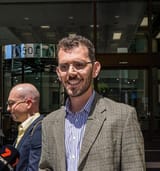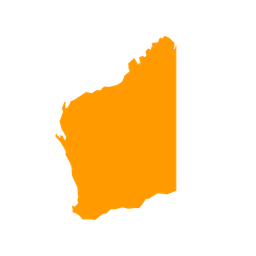Broken promises in Labor's nature
Plus: Bunbury Offshore Wind Zone declared.
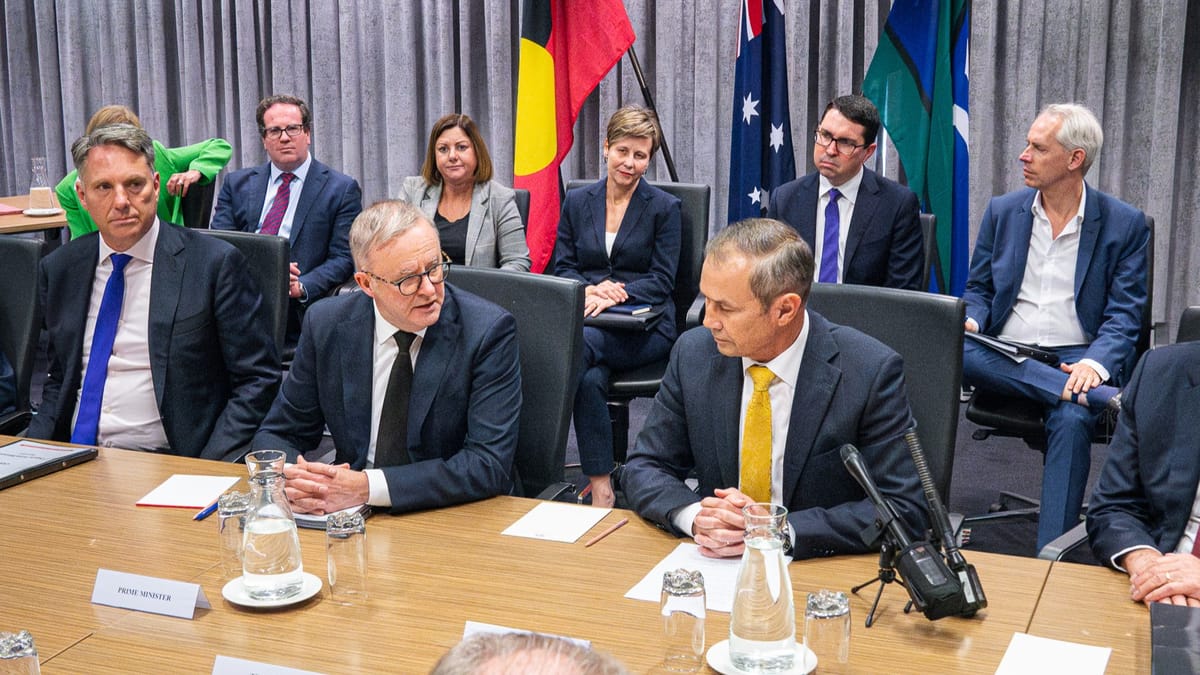
This week, The Last Place on Earth visited the Art Gallery of Western Australia to take in some culture – but a wall-of-text climate art installation left us feeling less than inspired. [READ HERE].
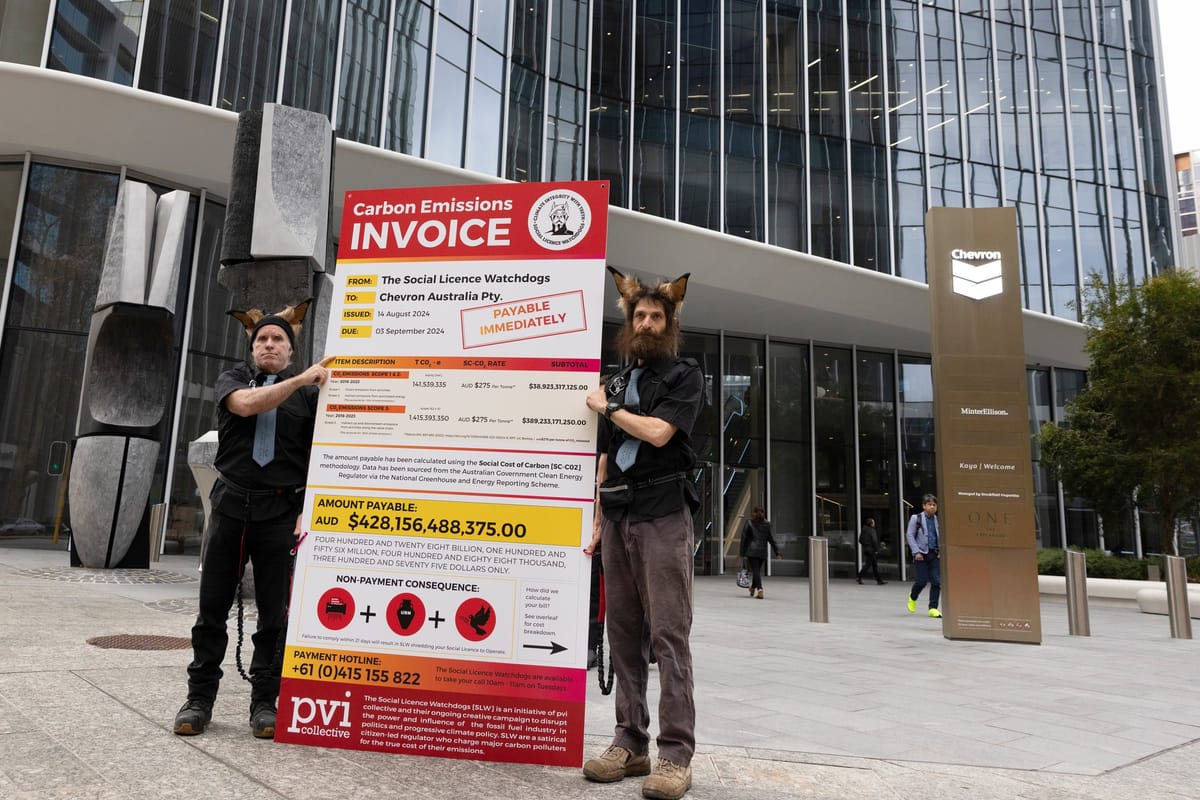
Meanwhile...
Lying down on the job?
'NATURE NEGATIVE', screamed the front page of The West Australian on Monday, the day after Prime Minister Anthony Albanese began his publicity tour of WA with his whole cabinet (bar one) in tow. Albo had told The West he was willing to perform the backflip the paper had vigorously campaigned for and water down the powers of the proposed Environmental Protection Australia (EPA) regulator. What was promised as a "tough cop on the beat" that would decide project approvals now looks like it could become a defanged compliance-only watchdog. The changes were supposed to secure the support of the Opposition, but as The West reported on Tuesday, it was not forthcoming. "The environment minister still hasn’t delivered updated national environmental laws, as was promised," said shadow environment minister Jonno Duniam. “All that is being proposed now is a new bureaucracy in the form of a Federal EPA to administer these broken laws." Meanwhile, the Greens and environment groups are far from impressed. "If Labor does a dirty deal with the Liberals to further weaken our already-weak environment and climate laws, Labor will lose any shred of environmental credibility it still thinks it has," said Greens leader Adam Bandt. Labor finds itself once more in its classic dilemma – caught between, on the one hand, the veneer of progressivism that stops it from bleeding more votes to the Greens, and on the other, its commitment to placating the whims of powerful business and media interests.
Where was Environment Minister Tanya Plibersek amongst all of this? Having the quintessential Western Australian tourist experience: taking a quokka selfie. "Best day EVER", she captioned the pic uploaded to Facebook on Tuesday. Maybe not for WA nature, which remains under threat.
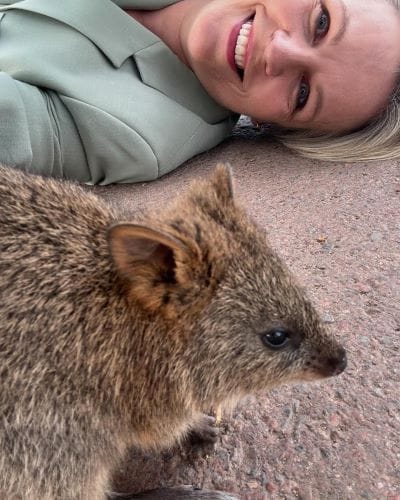
Few in the eastern states-centric Australian media seem to care about or understand the outsized influence of elite Western Australian interests on federal politics, but Bernard Keane of Crikey proved once again this week he's wise to the west:
"The WA government is a rotten plaything of mining and energy interests, operating as the policy arm, and private militia, of big miners and fossil fuel companies. By dedicating itself so determinedly to satisfying every demand emanating from the state, the Albanese government offers a national version of the WA disease, at huge expense to the taxpayer."
Those mining and energy interests were represented at a $2000-a-head Labor fundraising dinner at Kings Park attended by the Prime Minister on Monday night. Earlier in the day, Albo was hounded over the pitifully low taxes on oil and gas by someone The Daily Mail described as "an angry young Aussie on the street", who may look familiar to you.
And, as if to prove Keane's point, WA Premier Roger Cook continues to put pressure on his federal counterparts to water down Nature Positive reforms.
“We don’t want the federal government intervening and getting in the way of development in WA,” he said today, according to the Financial Review.
“I think they understand the WA government is resolute in making sure these laws do not threaten WA jobs, and our economy.”
Winds of discontent
Earlier this year, The Last Place on Earth produced both audio and written investigations into controversy over a proposed offshore wind farm zone in WA's South West region. Energy Minister Chris Bowen was in Bunbury on Monday to announce the wind zone declared. As WAtoday reports, the area has been reduced in size by half and pushed further from shore in response to community feedback. The Department of Energy, Climate Change, Environment, and Water says on its website that the declared zone "has removed more than 60% of area requested by recreational fishers, including the hotspot Naturaliste Reef," and "is further away from known Southern Right Whale habitat, to further reduce the chance of impacts."
It sounds like there were some wins for community members who took issue with the proposal, but a group of passionate locals remain unimpressed. "It's a really dark day in history for environmental protection, for biodiversity protection of endangered species," Save Our Beloved Geographe Bay campaign coordinator Martine Shepherd told the conspiracy-addled Western Australian independent media outlet Courage is the Cure. "The Federal government has totally disregarded the immense feedback from the people of Western Australia," she said.
Federal Liberal Member for Canning Andrew Hastie took a slightly different messaging tack but also seems determined to maintain focus on the wind wars.
"These adjustments [to the zone] are a direct response to the fierce resistance of our community, which has refused to be steamrolled by a Labor Government more focused on appeasing foreign powers than protecting its own citizens," he said.
"With over 2,600 submissions, the strength of our community’s opposition is clear.
"But let’s be clear: the fight is far from over."
The Maritime Union (MUA) released a statement in support of the declaration.
"We need to maximise the opportunity for local businesses, local manufacturing and local workers employed on strong, safe and well-paid union agreements to ensure the massive investment we’re seeing in this sector is economically beneficial to WA workers and their families,” MUA WA Branch Secretary Will Tracey said.
Meanwhile, a coalition of environmental groups released a cautious statement that supported renewable developments while warning that environmental impacts must be considered.
"We support renewable energy, and it should be built with minimal environmental impact to avoid repeating the mistakes of the past," said Busselton Dunsborough Environment Centre Convenor Craig Sisson.
“Geographe Bay is habitat for critically endangered species, and government and industry must work together with independent experts to protect migration zones and ensure that species like sea grass, whales, sea lions, turtles, and seabirds are monitored and protected as a matter of priority."

